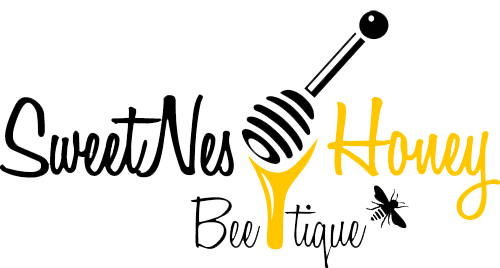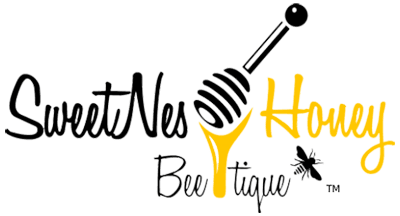Raw honey is honey that has been unprocessed, unaltered, unpasteurized, and unadulterated. This ensures that it still contains the pollen, enzymes, vitamins, minerals, etc. Raw local honey also contains a blend of local pollen, which can strengthen a person’s immune system, and reduce pollen allergy symptoms. Buying local honey preserves the beekeepers in your locality whose bees are pollinating your local vegetables, flowers and other important plants. By supporting local honey producers, you can verify that the honey you’re purchasing is truly raw and has the beneficial properties that humans have used for centuries to treat many ailments.
Liquid Honey: The most common form, where the honey is extracted by centrifugal force, or by gravity, from the wax comb. Some liquid honeys are slightly processed and gently heated. But are still considered “raw”.
Cream Honey: A smooth honey that has a consistency of butter. It is finely ground honey that has been blended with liquid honey.
The natural sugars in honey (Glucose & Fructose) will bind together and begin to form little crystals, which can start making your honey harder. This does NOT mean the honey is bad! Crystallization happens naturally over time to pure, raw honey and actually helps preserve the nutrients and quality.
There are a number of ways to de-crystallize your hardened honey.
- One way to de-crystallize your honey is by placing your honey jar in a pot of hot water. Let soak for several minutes until the honey has softened and reliquefied itself again.
- Place honey outside in full sunlight on a hot day, leave until it reliquefies.
- You can also leave the jar of honey in your vehicle on a warm day.
- Roll jar up in a heating pad at its lowest setting. Be sure to monitor closely when using this method, as you do not want to overheat.
- Do NOT microwave or overheat your honey! Doing so will destroy all of the good stuff like antioxidants and enzymes.
Cut Comb is honey intended for consumption which is still contained within its original hexagonal-shaped beeswax cells, called honeycomb. It is eaten as produced by honeybees and has not been processed, filtered or manipulated in any way.
Chunk Honey is a combination of extracted liquid honey and comb honey. Cut pieces of comb honey are placed in a wide mouth jar and then the empty space around the comb is filled with liquid honey.
Bee pollen is a natural mixture of flower pollen, nectar, bee secretions, enzymes, honey and wax used as a nutritional supplement. Natural health practitioners promote it as a superfood due to its nutrient-rich profile that includes tocopherol, niacin, thiamine, biotin, folic acid, polyphenols, carotenoid pigments, phytosterols, enzymes, and co-enzymes.
It’s widely available in dietary supplement form used for the following health conditions:
- Acne
- Allergies
- Arthritis
- Asthma
- Eczema
- High Cholesterol
- Osteoporosis
In addition, bee pollen is said to enhance energy, sharpen memory, slow the aging process, promote weight loss, and improve athletic performance.
The answer is YES, but as with any carbohydrate source (including table sugar), you’ll need to keep an eye on your portion and count those carbs. One advantage of using honey over sugar is that honey’s flavor is more pronounced and concentrated than that of sugars. This means that you may find that you can use less of it for the same level of sweetness!
Honey can contain spores of bacterium calledClostridium Botulinum Bacteria, which can germinate and produce a toxin in a baby’s immature digestive system, leading to a rare but serious illness known as “infant botulism.” The presence of botulism does not mean our honey supply is contaminated. Indeed, the bacteria are harmless to adults and children over 1 year old who have developed matured large intestine.
Bees forage three miles in all directions around the hive and possibly up to five miles around the hive for pollen and nectar. This is an area of just over 78 square miles of potential forage for one hive. Even if the bees foraged for three miles, that’s 28 square miles. In the 28-78 square miles, the plants must be free of fungicides, pesticides, and synthetic fertilizers. They must also not be genetically modified. These four requirements alone make organically produced honey practically impossible for any US based beekeeper. As of 2020, honey cannot be certified organic by the USDA. Any USA Certified Organic honey sold in the United States is imported from other countries and certified organic by that country. A US beekeeper can have non-certified organic honey that is raised organically. But it is nearly impossible to produce organic honey. Also, beekeepers are currently unable to make any organic claims. Any US beekeeper labeling their honey as organic would be significantly bending the truth to increase profit and sales.
This is a tricky one as it depends very much on why people are vegan. If they disagree with using any animals in food production then no, bees are still used to make honey. If it’s a worry about killing insects then it depends, as honey is a by-product of a bee. Certainly, we are cultivating and intruding on their natural life cycle and some bees may get harmed in the process of honey-extracting. If it’s for the environmental reasons, bee cultivation when farmed properly can aid in biodiversity and pollination of important edible and non-edible plants. Of the risks, a beekeeper can also spread disease and create competition if not properly managed.
Bee Colonies have been disappearing at alarming rates in many parts of the world due to the accumulated effects on parasitic mites, viral and bacterial diseases, exposure to pesticides and herbicides, as well as loss of habitat. The decline of flowers due to herbicides, pesticides and crop monoculture affect the numbers and diversity of bees. As native vegetation is replaced by roadways, manicured lawns, crops and non-native gardens, pollinators lose the food and nesting sites that are necessary for their survival.
- Plant pollinator friendly gardens with native bee friendly plants.
- Do NOT use any pesticides, fungicides or herbicides on plants in your garden.
- Avoid planting manicured lawns. Instead, plant prairies.
- Do not weed your garden. Many plants like dandelion, for example, are an excellent source of food for bees.
- Give the bees water by installing a water basin. Put a few stones or floating corks in it so the bees don’t drown.
- Educate yourself and your children about bees. Bees are NOT dangerous. By better understanding them we can learn to respect them.
- Support local beekeepers and buy local honey. Beekeepers care about the bees and our environment!
- Become an advocate for the bees and other pollinators!
Unfortunately, this happens often, the bees decide to take up residence in the eaves or walls of your home or other structure you do not wish to have bees in. If this happens, the best option is to reach out to a local beekeeper to have the bees safely removed and relocated. You can find a beekeeper close to you through your local Beekeepers Associations or a quick online search for safe bee removal. Ask questions such as, “Are you a beekeeper?” “What do you do with the bees once they are removed?” “Do you have any honey for sale?” etc. to ensure they are indeed beekeepers and will safely relocate the bees. Avoid calling an exterminator as they will most likely spray them, killing the bees.
First of all, if you think, or know you may be allergic to insect stings, visit an allergist to get a diagnosis and treatment if needed. Your healthcare provider may prescribe an epinephrine shot for you to carry with you to use in case you are stung. If you are diagnosed with an insect venom allergy, you’ll want to be very careful to avoid places where there are bees, wasps, or hornets. Keep your doctor advised of any reactions or symptoms you may have. With that being said, and you have no allergic reactions. You can catch the BuUzZz of beekeeping by joining your local Beekeepers Association and attending club meetings. Get to know other beekeepers and spend time in their apiaries to see if it is right for you. Become a beekeeping book collector and read as much as you can. Knowledge is power! Join in on field days, workshops and any other beekeeping events available in your area. From there you will learn what equipment you will need and how to get your bees. Or you can reach out to us at SweetNes Honey Apiaries & Beetique to get you started!

